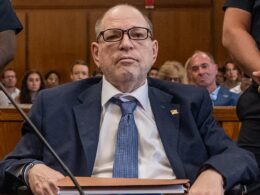Two top leaders of Mexico’s Sinaloa drug cartel were arrested by US agents in Texas during a dramatic operation and without the involvment of Mexican authorities.
Cartel co-founder Ismael “El Mayo” Zambada pleaded not guilty to drug charges in a US court on Friday.
He was taken into custody a day earlier along with Joaquin Guzman Lopez, a son of another cartel co-founder, Joaquin “El Chapo” Guzman, who is already in a US prison.
What are the implications of the capture of two of Mexico’s most wanted drug traffickers?
Impact on Sinaloa cartel
US Drug Enforcement Administration (DEA) chief Anne Milgram said Zambada’s arrest “strikes at the heart of the cartel that is responsible for the majority of drugs, including fentanyl and methamphetamine, killing Americans from coast to coast.”
But experts said the capture would not deal a knockout blow to the powerful criminal organization.
It was “an important but mostly symbolic victory” for US authorities, according to analysts at the InSight Crime think tank.
Zambada, a veteran drug lord who had evaded justice for decades, was thought to have already taken a step back from the cartel’s day-to-day operations, they wrote.
Falko Ernst, an analyst at the International Crisis Group think tank, described the cartel as “a structure with a thousand heads that won’t fundamentally change shape” with the fall of one or two kingpins.
Effect on drug smuggling
“A substantial reduction of the flow of fentanyl and other drugs to the United States is unlikely,” Vanda Felbab-Brown, an expert at the Washington-based Brookings Institute, wrote in a commentary.
“Infighting aside, the Sinaloa cartel has redundancy systems for smuggling, and two of the Chapitos (the sons of El Chapo) are still at large, including Jesus, Sinaloa’s boss for international operations,” she added.
Even if the Sinaloa cartel were to implode, the rival Jalisco New Generation cartel would take over its fentanyl distribution to the United States, Felbab-Brown predicted.
InSight Crime analysts agreed that “these captures are not likely to affect the flow of synthetic drugs, especially fentanyl, into the United States.”
Relatively low barriers to entry in the synthetic drugs supply chain had reduced the importance of single players like the Sinaloa cartel, they added.
Will cartel violence increase?
The Sinaloa cartel is engaged in ultra-violent turf wars with rival groups, which experts said might try to seize the opportunity to expand their operations.
Even within the organization there is infighting between rival factions.
The arrests “will likely augment the already very intense criminal violence in Mexico and possibly leave behind a criminal market even more threatening to the United States,” according to Felbab-Brown.
The fighting may strengthen the “far more vicious” Jalisco New Generation cartel, she warned.
According to Ernst at Crisis Group, there are about 200 armed criminal groups in Mexico, complicating efforts to control drug trafficking.
He also fears an intensification of fighting with the Jalisco New Generation cartel as well as between Sinaloa factions.
Diplomatic repercussions
The Mexican authorities said they were not involved in Thursday’s operation or told about it beforehand.
Mexico has in the past complained about being kept in the dark about DEA activities — notably after the United States’ arrest of former Mexican defense minister Salvador Cienfuegos on drug trafficking charges in 2020.
President Andres Manuel Lopez Obrador accused the DEA of fabricating drug trafficking crimes against Cienfuegos and limited the operations of foreign agents on Mexican soil in response.
“Relations are already very damaged. I don’t think they can be damaged any further” by the Sinaloa cartel arrests, Mike Vigil, a retired chief of international operations at the DEA, told AFP.
He believes that Washington did not tell Mexico until Zambada and Guzman Lopez were in US custody to avoid jeopardizing the operation.
“If Mexico is informed, that information can be compromised in a minute,” Vigil said.







